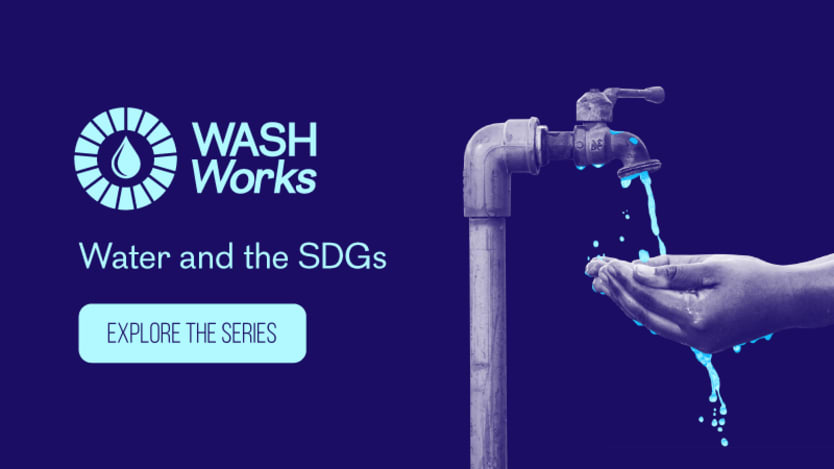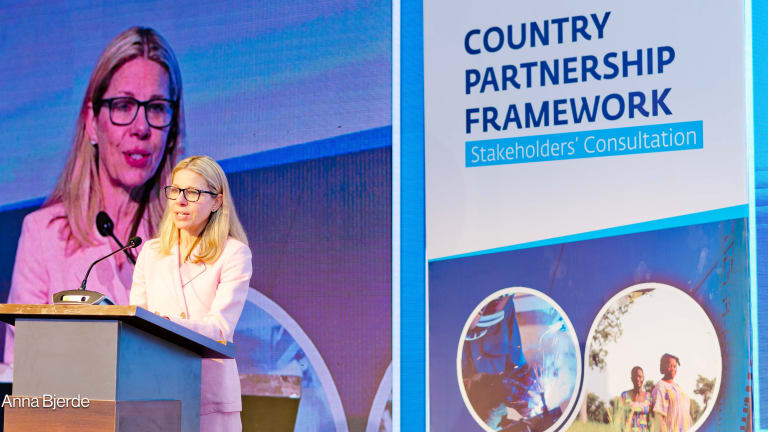
Calls from activists to African governments to resist pressure to privatize water are growing.
One such example was at the sidelines of the 2021 World Bank Group and the International Monetary Fund annual meetings last month, where the Our Water, Our Right Africa Coalition — launched by Corporate Accountability and Environmental Rights Action in 2014 — warned of the dangers of water privatization.
“No matter where you are from on this continent, the threat of water privatization is real,” Akinbode Oluwafemi, executive director at Corporate Accountability and Public Participation Africa, or CAPPA, said at a briefing. Calling it “a failed development model,” he said that Africa shouldn’t be the dumping ground for such a system.
The risks of privatization, according to a report by Léo Heller, former United Nations special rapporteur on the human rights to safe drinking water and sanitation, include unaffordability and unsustainability, possible deterioration of services, and increased opportunities for corruption.
Half of the world is failing to manage its water resources
With water-related hazards on the rise and the number of people experiencing water stress increasing, experts say the need for better water management is key.
Yet access to clean water still eludes 76% of people in sub-Saharan Africa. Sometimes, according to Aminata Touré, former prime minister of Senegal and a member of Sanitation and Water for All’s Global Leadership Council, the private sector is the one with the tools and capabilities to access water that may be hard to reach.
“In countries close to the Sahel … the water is there but it’s deep down and you need huge resources to get it out. You have to invite those who want to invest in it but, at the same time, make them understand this is not any commodity, this is water and water is precious to life,” she said.
With resources constrained, the private sector’s resources may be key to achieving access to water for all by 2030, but its risks mean many are wary of how to handle such engagement.
“What sometimes happens is that the government just washes its hands. It sees the private sector is doing it … so they don’t bother about it. That’s where things fall down.”
— Sanjay Banka, managing director, Banka BioLooPrivate sector participation in Africa
Over the years, private sector participation in water supply — either standalone or as part of public-private partnerships — has evolved in parts of the continent, including Senegal, Cameroon, Gabon, and Ghana.
According to a report by CAPPA and the coalition, participation hasn’t necessarily increased access.
In Cameroon, water shortages and irregular supply were experienced during a 10-year privatization contract with Camerounaise des Eaux and the Cameroon Water Utilities Corporation.
In Senegal, shortages still persist under Suez’s management of much of the country’s urban and semiurban water service. And in Gabon, bill irregularities and environmental hazards were noted throughout Veolia’s operation of the utility. These were further highlighted when typhoid, a water-borne disease, broke out to the backdrop of poor water supply in 2005.
If governments were to extract and manage water services instead, such problems may still exist, according to Sanjay Banka, managing director at Banka BioLoo — an enterprise providing WASH infrastructure in India — and former private sector representative of the Sanitation and Water for All steering committee.
Governments don’t have the resources, capacity, and capability to take on water provision, and if they do, there can also be delays and problems, he said. “It needs the help of other actors in the ecosystem to implement and to execute.”
The best model, he explained, is one in which WASH infrastructure is implemented by the private sector, has awareness raising, and in which behavior change activities are taken on by the nonprofit sector, and governments strongly regulate the private sector.
“What sometimes happens is that the government just washes its hands. It sees the private sector is doing it and the citizens are getting it, so they don’t bother about it. That’s where things fall down,” he said, adding that instead governments — via a small governmental team to deal with complaints — should be ensuring there is no undue profit-making or substandard services. If there are, it should be dealt with in an appropriate time frame, Banka added.
The private sector needs to be negotiated with, Touré said, so they have an incentive to invest but that there are pricing policies that are adjustable to people’s needs and incomes. In Senegal, social pricing allows those with limited resources to pay a lower price.
Putting a price on water
Through its “cascade approach,” the World Bank prioritizes the use of private sector funding where possible, as a means of addressing the $2.5 trillion per annum funding gap there is for achieving the Sustainable Development Goals. This has played out in a number of water projects.
For example, the bank supported the management of rural piped water systems by private sector operators in Benin. And in Kenya, it helped the government raise $25 million in private financing toward a national development plan for water and sanitation access for all by 2030.
On its website, the bank says it “doesn’t have a preference for public or private service” and that the World Bank Water Global Practice supports “177 public sector projects focused on improving public sector services to citizens with the largest programs in water supply and sanitation followed by irrigation and water resources management.”
The issue, according to Banka, is that people are not comfortable with there being a price to pay for water. They think it should be treated like air, but clean water is not something that’s in abundance, he explained, and so someone — either the consumer or the government who likely reaps the cost through taxes — has to pay the cost.
For Oluwafemi, governments should instead be investing in meaningful public participation in water governance, enshrining the human right to water in law, and improving the salary and welfare of utility workers.
Several figureheads have come out in support of the coalition’s mission to end water privatization in Africa, including Heller, Anne Le Strat, former deputy mayor of Paris, and Philip Alston, former U.N. special rapporteur on extreme poverty and human rights.
The Pro read:
UN special rapporteur for water on the need for WASH leadership
When it comes to the global water crisis, the U.N.'s interagency coordinating mechanism, UN-Water, should be taking more of a leadership role, says Pedro Arrojo-Agudo.
This comes after the U.N.’s open-ended intergovernmental working group for the “elaboration of an international legally binding instrument on transnational corporations and other business enterprises with respect to human rights” held its seventh session at the end of October. The group is focused on developing a “legally binding instrument” to regulate the activities of corporations operating overseas in regard to human rights adherence. The human right to water and sanitation was recognized in 2010.
While guiding principles on business and human rights created by the U.N. Human Rights Council do exist and serve to ensure corporations don’t infringe on rights, they are not legally binding, which this new instrument would be. Its rollout is yet to be determined.
An ongoing debate
This is the latest in a string of events that have questioned how water is being financialized.
In June, civil society groups protested the emergence of water on the stock exchange and in October, there was controversy when Heller released his report on the human rights risks of privatizing WASH and how to mitigate those. AquaFed, the International Federation of Private Water Operators, said the process behind the report had been “anti-private-sector” and “prejudged.”
More recently, the new U.N. special rapporteur on the human right for water and sanitation, Pedro Arrojo-Agudo, called for U.N. intervention to invoke democratic water governance that isn’t influenced by private interests.
But because they mobilize such an important amount of resources, they have to be part of discussions around water access, Touré said.
The World Bank and World Water Council’s 9th World Water Forum is scheduled to happen in Senegal in March. The Alternative World Water Forum will take place at the same time, also in Senegal, with a focus on discussing how to resist the commodification of water.
Hopefully, one day water will be free for all, Touré said, but, until then, every effort must be taken to make it accessible to all.
Visit the WASH Works series for more coverage on water, sanitation, and hygiene — and importantly, how WASH efforts intersect with other development challenges. You can join the conversation using the hashtag #WASHWorks.









